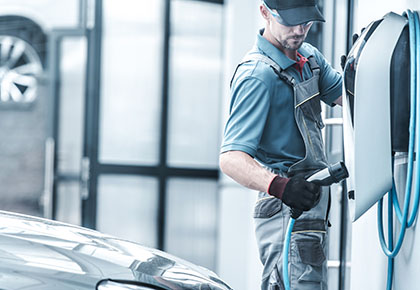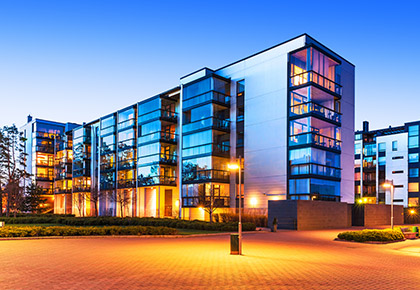-

Six steps to implement EV charging in high-rise condos
No longer the products of science fiction fantasy, electric cars are now a reality of everyday life. While the reduced emissions of personal electric vehicles, or PEVs, are good news for the environment, their charging requirements may create challenges for condo associations trying to navigate their infrastructure requirements, legal implications, management concerns and even aesthetic considerations. -
Six Things to Know About Fire Hydrants
Aside from knowing to not park next to one, how deep is your knowledge of fire hydrants? Unless you’re a firefighter, it’s probably not that extensive. This may not be a problem... until the unthinkable happens and you need to be confident that your fire hydrants are in good working order. But like any equipment in your community, fire hydrants need to be maintained. -
3 common residential drainage problems and their solutions
Unless you live in an area where it hardly ever rains (in which case you have a whole other set of problems), drainage will be an issue in your community. Proper drainage is, of course, the answer, but getting there means you have to meet stringent requirements throughout different areas of your community. -
Tips for Eco-Friendly High-Rise Living: Living Sustainably in the City
Many multifamily properties and high-rises want to implement “green” living practices and create eco-friendly communities, but not everyone knows where nor how to get started. Here are some effective and easy tips to help you be proactive and successful in achieving your sustainability goals. Read on for a list of programs and services that can be put in place in your community at little to no cost. -
Tips to Help Your HOA Winterize Your Community
It’s that time of year again – there’s a noticeable nip in the air, trees are losing their leaves and stores are starting to display their holiday swag. That can only mean one thing – winter is right around the corner. If your HOA is located in an area affected by wintry weather, we probably don’t need to remind you about last year’s Arctic-level freeze. Some of the coldest-ever temperatures were recorded in many parts of the country – and if you heed the predictions in the Old Farmer’s Almanac , you know that this year promises to be even more frigid. Is your community prepared to handle the upcoming chill? Here are some tips to help your homeowners association winterize your community, no matter what surprises the season may bring. -
Tips to Help Your Homeowners Association Organize a Community Recycling Program
Is your homeowners association considering starting a recycling program for your community? If so, bravo! Take a look at some of the benefits: conserving energy, saving water, preserving resources, reducing air pollution and saving landfill space. And did you know that in addition to helping the environment, recycling can also provide economic benefits as well? To get you started, here are some tips and considerations to help your association plan and implement a successful recycling program for your community. -
Ways to Keep Your Community Safe During Tornado Season
Tornadoes are fearsome because of their unpredictable nature. Although there are certain weather conditions that make tornadoes more likely, such as severe summer thunderstorms, tornadoes can also be created by snowstorms and blizzards. They can strike at any time of year and almost any place, even forming on the water and moving onto land. -
How to Uncover Savings for Your Condo or Co-op Association with an Energy Audit - Energy Efficiency Part 2
Improving your building’s energy efficiency is good for your budget and for your property values. Getting a professional energy audit is a crucial step on the road toward energy efficiency. It can tell you which upgrades make the most sense for your property and show you potential energy and cost savings. -
Updating Your Community Emergency Preparedness Plan for Pandemics
In the past, when planning for emergencies, a global pandemic was likely not on your list. While most board members did not anticipate a pandemic as something that needed a plan before COVID-19, it's now clear that communities need to develop a plan to address this and any future pandemics. Read on to learn how to build a community emergency preparedness plan with a possible resurgence of coronavirus and other potential pandemics in mind. -

5 ways to reduce energy costs in your condo or coop
No matter where your high-rise building is located, rising energy costs can have a drastic impact on your community association’s budget. Implementing methods to conserve energy can help your association reduce energy costs and optimize your high-rise’s annual budget. -
What to Know in the Unlikely Event of a Mass Shooting in Your Building
Public Mass shootings have unfortunately become common place in America and around the world. From schools and movie theaters, to businesses and homes, shootings have occurred in a mix of environments. But what should you do if you unexpectedly find yourself in the middle of this kind of emergency at your residential building? -
What Do I Need To Know About Floods?
2016 saw the United States swamped in a record year of flooding, the most since record keeping began in 1980. Devastating flooding swept Louisiana, West Virginia, Texas and Maryland, costing billions in damage. In Canada, about half of all natural disaster costs are incurred from flooding, reaching into the billions of dollars in recent years. -
Which of These Three Maintenance Styles Describes You?
Nothing bites into your budget like maintenance issues. Whether it’s the grounds keeping and upkeep that you pay for on a regular basis or those surprise projects (natural disasters, anyone?) that sneak up on you, maintenance can account for an average of 25% or more of your overall expenditures. -
Why Your Community Must Plan for Emergency Communication and Training
Whether you live in a high-rise condominium in Chicago, a homeowners association (HOA) in Houston or an active adult community in Las Vegas, emergencies can happen. Do you think your residents would know where to go or whom to contact in an emergency situation? Does your onsite staff know what to do to protect residents and the community’s property in the event of a major storm like a hurricane, tornado or severe blizzard? How well would they handle a flood, a fire or a violent outbreak? -
Winter Pipe Safety Measures
So winter’s coming...and you’ve got a watchful eye on driveways, roofs and other essential areas. But don’t forget about one of the most freeze-sensitive parts of your buildings and systems: pipes. -
12 to-do’s for ultimate HOA landscaping maintenance
A good spring-cleaning can do wonders for your community association. Here are some tips to get your started. -
15 Things You’ll Want to Do Before Selecting an Insurance Agent
Insurance is one of the most important line items on your association's budget, but it is oftentimes the most expensive. Do you know how to select the right agent? -
How to Get Rid of Millipedes and How to Prevent Their Invasion
Ah, Florida nights. Perfect temperatures. And...a disgusting mass of undulating insects climbing up the side of your building? Learn how to get rid of millipedes. -
Avoid Maintenance Surprises with a Property Maintenance Plan
There is no way to avoid surprises when it comes to the maintenance of your community. Preventative maintenance ensures that your systems are keeping future problems at bay; predictive maintenance is also effective. -
What to Know About an HOA Emergency Board Meeting During Trying Times
It's hurricane season again. As soon as June 1st rolls around, we are assaulted with hurricane preparedness pamphlets and emergency information at every turn. -
Can You Go After HOA Owners for Their Guests’ Damages?
Every community can expect to experience negligent or careless guests who will either cause a ruckus, or worse, damage association property. When that happens, deciding who should be held responsible for their actions can create a delicate – and potentially volatile – situation. Oftentimes, Boards may go after the owner, but they shouldn’t forge full-steam ahead without some sort of ammunition. -
Communication in an Emergency is Key to Hurricane Preparation and Rebuilding
The strongest hurricane preparedness plan won’t be effective if you haven’t communicated it. Make sure that everyone knows what to do by following these important recommendations. -
Wondering What to Ask a Property Management Company in Florida? Here's 8 Questions
Know what questions to ask a prospective property management company in Florida? Check out our list to ensure you have all the right information before making a choice. -
Energy Efficiency for Community Associations
Many community association boards and residents would like to implement energy efficiency measures in their communities. But what about the cost to get started?